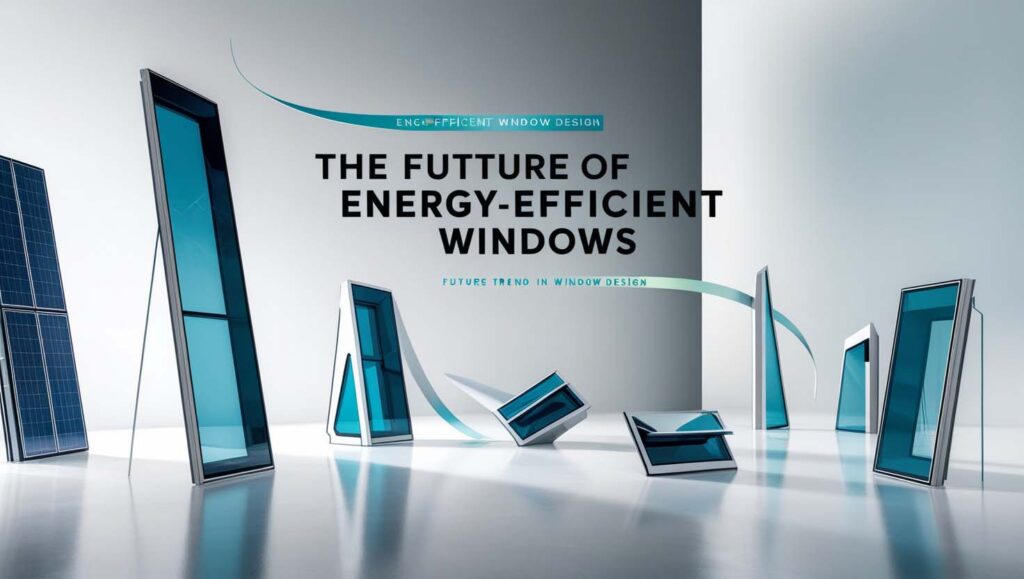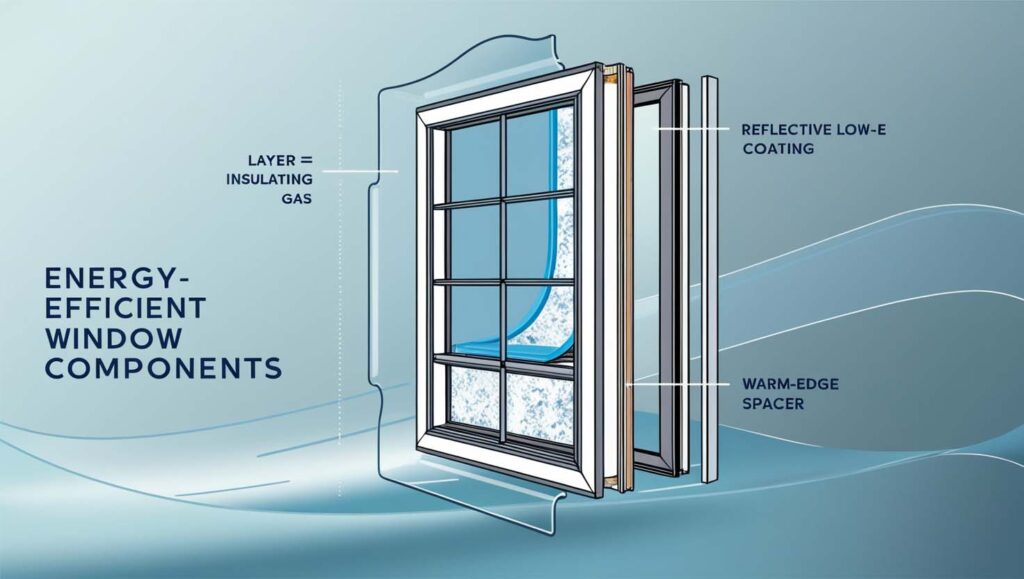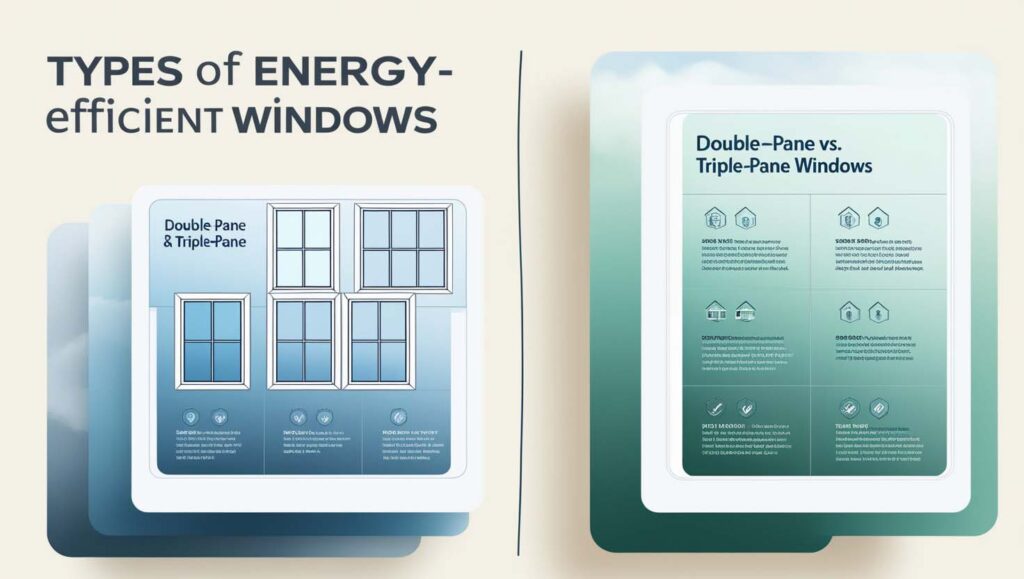Energy-Efficient Window Replacement: A Smart Upgrade for Modern Homes
Introduction
Have you ever felt like your home’s heating and cooling systems are working overtime, but you’re still uncomfortable? If so, your windows might be to blame. Replacing outdated windows with energy-efficient ones isn’t just a trendy upgrade it’s a smart investment. Let’s explore how energy-efficient window replacement can transform your home into a more comfortable, eco-friendly, and cost-effective space.
What Are Energy-Efficient Windows?

Defining Energy-Efficient Windows
Energy-efficient windows are specially designed to minimize heat transfer between your home and the outside environment. They keep your home warm in winter and cool in summer, reducing your reliance on HVAC systems.
Key Features of Energy-Efficient Windows
- Low-E Glass Coatings: Reflect heat while allowing natural light in.
- Double or Triple-Pane Designs: Trap insulating air or gas between layers of glass.
- Gas Fills and Spacers: Use argon or krypton gas for better insulation.
- Insulated Window Frames: Prevent air leaks and enhance overall efficiency.
Benefits of Energy-Efficient Window Replacement
Lower Energy Bills
One of the biggest perks is the potential savings. Energy-efficient windows reduce heating and cooling costs by maintaining a consistent indoor temperature.
Enhanced Comfort
No more chilly drafts in winter or overheated rooms in summer. These windows provide year-round comfort.
Environmental Impact
Using less energy means a smaller carbon footprint. It’s a win for your wallet and the planet.
Increased Home Value
Buyers love eco-friendly features, and energy-efficient windows can boost your home’s resale value.

Signs You Need to Replace Your Windows
Rising Energy Costs
Feeling a draft near your windows? It’s a sign they’re no longer insulating properly.
Drafty Rooms
If your energy bills are climbing, inefficient windows could be the culprit.
Condensation Between Panes
Foggy or wet panes indicate failed seals and poor insulation.
Visible Damage or Wear
Cracks, warping, or rot are clear signs it’s time for an upgrade.
Types of Energy-Efficient Windows
Double-Pane vs. Triple-Pane Windows
Triple-pane windows offer better insulation but are pricier than double-pane options.
Vinyl, Wood, and Fiberglass Frames
Each material has pros and cons. Vinyl is affordable, wood is elegant, and fibreglass is durable.
Custom vs. Standard Sizes
Custom windows fit perfectly but cost more than standard sizes.
Choosing the Right Energy-Efficient Windows for Your Home
Understanding Window Ratings (U-Factor, SHGC, etc.)
Lower U-Factor values mean better insulation. SHGC measures how much solar heat is allowed in.
Selecting the Right Frame Material
Pick a material that suits your climate and aesthetic preferences.
Picking the Right Style (Casement, Awning, etc.)
Different styles offer varying levels of efficiency and functionality.

The Installation Process
Professional vs. DIY Installation
While DIY might save money, professional installation ensures optimal performance.
Preparing Your Home for Window Replacement
Clear the area around your windows and remove obstacles for smooth installation.
What to Expect During Installation
The process typically involves removing old windows, prepping the frame, and installing new ones.
Cost of Energy-Efficient Window Replacement
Average Costs by Window Type
Prices vary by type, ranging from $200 to $1,000 per window.
Factors That Affect Pricing
- Size and material
- Installation fees
- Additional features like tints or special coatings
Financing Options and Incentives
Tax Credits and Rebates
Many governments offer financial incentives for installing energy-efficient windows.
Energy-Efficiency Loans
Special loans can help offset upfront costs.
Maintaining Your Energy-Efficient Windows
Cleaning and Care Tips
Use non-abrasive cleaners and avoid harsh chemicals to maintain their integrity.
Identifying and Addressing Common Issues
Check for leaks or damage periodically and repair them promptly.
Common Myths About Energy-Efficient Windows
“They’re Too Expensive”
While the initial cost is high, the long-term savings make them worth it.
“They Don’t Make a Big Difference”
Data shows significant energy and cost savings with these windows.
“They’re Only for New Homes”
Energy-efficient windows can be installed in any home, old or new.
The Future of Energy-Efficient Windows
Innovations in Window Technology
Expect advancements like smart glass and dynamic tinting.
Trends to Watch
Sustainable materials and AI-driven designs are on the horizon.
Conclusion
Upgrading to energy-efficient windows is more than just a home improvement project; it’s a lifestyle upgrade. From reducing energy bills to enhancing comfort and increasing your property’s value, these windows offer an array of benefits that make them a worthwhile investment. Whether you’re looking to create a greener home, enjoy year-round comfort, or boost your home’s curb appeal, energy-efficient window replacement is a choice you won’t regret. Take the leap today and see the difference it makes for your home and the planet.
FAQs
How much can I save on energy bills with energy-efficient windows?
Homeowners can save up to 30% on energy bills.
How long do energy-efficient windows last?
They typically last 20-30 years with proper care.
Can I install energy-efficient windows myself?
DIY is possible but not recommended for optimal results.
Are there any government incentives for energy-efficient windows?
Yes, many programs offer tax credits or rebates.
Do energy-efficient windows require special maintenance?
No, regular cleaning and periodic checks are sufficient.




